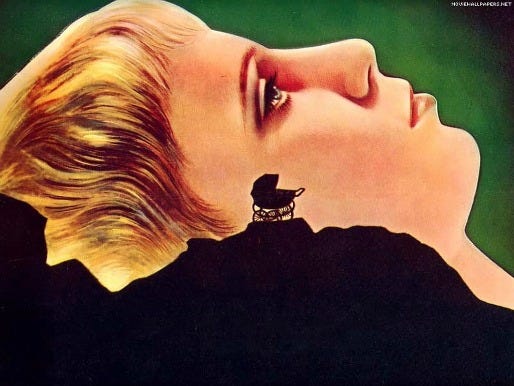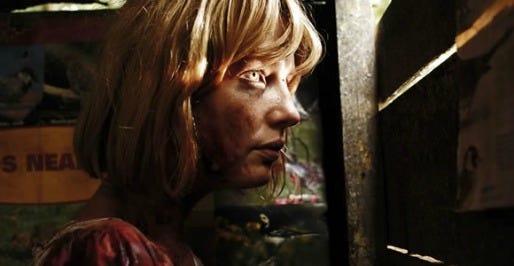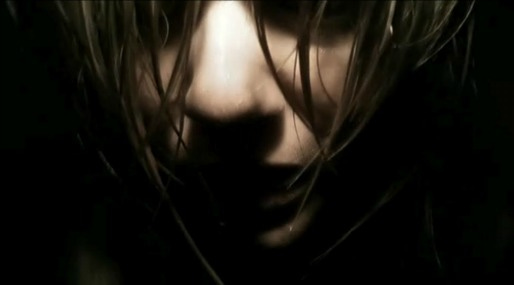No Sleep...November?!
Rosemary's Baby
“Rosemary's Baby” is deeply unsettling.
What do I expect from a film about Satan's child? "Rosemary's Baby" has been around for 50 years, "The Omen" has been around for almost 40 years, I've been around for 23. Do the math. I grew up hearing about "Rosemary's Baby" and expecting ... well, expecting something else. Nothing short of the end of the world.

“Rosemary's Baby” is considerably more humble in its ambitions. Rosemary and her husband, Guy (John Cassavetes), move into a new flat. He's an actor, she's a housewife and they're ready to start a family. They become friends with an elderly couple in the apartment next door, the Castevets, (Ruth Gordon and Sidney Blackmer), who are ... energetic about having a young couple with whom to socialize. When Rosemary becomes pregnant — after an evening she can't quite remember — the Castevets do everything they can to help her, right down to suggesting the best doctor. Guy echoes their insistence. Rosemary has everything she could want, really. A helpful extended family, a successful husband and, soon, a new baby.
As you probably already know, Rosemary is betrayed by her surrogate parents and her husband. Her body is used to fiendish perfection as a Satanist coven's personal incubator. The only friends who can help her see the truth are systematically eliminated. Through most of the film, she chooses to believe, despite doubts, that her family wouldn't betray her. Even when she learns the truth and protests it to a third party, they don't believe her. Satanists? Yeah, right.
It's an exercise in frustration, filmed to fiendish perfection by Polanski. The infamous Satan rape scene isn't as gaudy as it sounds. It's dreamlike, symbolic, awful. Rosemary catches glimpses of the Castevets and Guy standing naked alongside the rest of their coven above her motionless body, but she's too drugged to comprehend the reality of it. Images of boats, of water, of Satan's eyes tell the story better than a more overt depiction of the act itself. And those claw marks on her back when she awakens the next morning? Yeesh.
Mothers are central to culture, and using motherhood as a fear generator isn't uncommon in horror. But horror films usually seem to focus more on the physical act of birth or what comes out. “Rosemary's Baby” perverts less gory aspects of pregnancy. It turns her family against her, traps her in the web of her own social circle. The film is a slow burn, terribly fatalistic. And that last scene? In the end, Rosemary's own desire to be a mother to her child betrays her.
A mother's love ends the world. What a delicious downer.
Eden Lake

“Eden Lake” is harsh, unrelenting, cynical. Jenny (Kelly Reilly) and Steve (Michael Fassbender) are two London yuppies on a weekend getaway at a rural lake. They get on the wrong side of Brett (Jack O'Connell) and his gang of violent, unruly teens. What follows is a 91-minute chase scene filled with high tension and dashed hopes. It's well-made, well-shot, even beautiful at times. Reilly plays a victim who isn't a badass, and Fassbender's always nice to look at.
Nonetheless, I found “Eden Lake” unappealing. It's about as on-the-nose as it gets. Yes, real people do real horrible things. But the movie's commentary lacks subtlety to the extent of being somewhat cartoonish. It's grim, gritty and self-serious. It doesn't try to do anything interesting with social concerns about the poor, the young or the rural beyond making them physically terrorize our heroes. There's no symbolism, no metaphor. What bothers me most, I guess, is that the social scenario depicted in "Eden Lake" is devoid of nuance. It's like something you'd hear on talk radio.
There are a lot of "real-life" scenarios to see in horror films, but that's not what I want to watch a horror film for. I watch them for ghosts, monsters, devil babies — clever metaphors that leave a certain amount of distance for the viewer to feel a "safe" scared. When the only villain of a horror movie is a pack of unruly teenage dickheads and their redneck parents whose methods are entirely realistic, it's unpleasant.
REC / REC 2

"REC" is a Spanish found-footage zombie film about a film crew trapped in an apartment complex quarantined due to a mysterious outbreak, which we later learn is a zombie outbreak. It's good at what it does. The characters are three-dimensional, and the found-footage perspective feels natural for the story. It's a damn fine zombie thriller.
"REC 2," on the other hand, takes the film in another direction. It picks up seconds after the end of "REC," this time following the dual perspectives of a SWAT team that enters the building and a couple kids who snuck in beneath the quarantine. "REC 2" uses the two-camera gimmick rather well up until the midway point, when the entire film becomes kind of tedious in its attempts to outdo the first in action while maintaining the perspective. While "REC 2" does provide an interesting origin for the zombie virus seen in the first film, the narrative provides little reason to care.
PREVIOUS “NO SLEEP OCTOBER” COLUMNS:
Halloween (1978) & Friday the 13th (1980)


